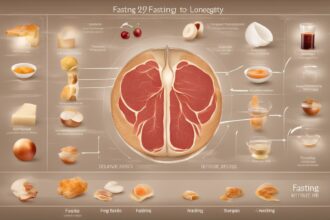Have you ever wondered if there’s a simple, natural way to extend your lifespan while improving your overall health? Enter longevity fasting—a powerful practice that combines the ancient art of fasting with modern science to promote a longer, healthier life. Fasting isn’t just about skipping meals; it’s a strategic approach to reset your body, enhance cellular repair, and combat aging. In this post, we’ll dive deep into how fasting for longevity works, explore the science behind it, and share actionable tips to help you incorporate this practice into your life. Whether you’re new to fasting or a seasoned pro, there’s something here for everyone looking to optimize their healthspan.
What Is Longevity Fasting and Why Does It Matter?
Longevity fasting refers to structured periods of reduced or zero calorie intake with the specific goal of promoting a longer lifespan and better health. Unlike fasting for weight loss or detoxification, the focus here is on triggering biological processes that slow aging and protect against age-related diseases. Think of it as a reset button for your body—giving your cells a chance to clean house and repair damage. Studies have shown that fasting can activate pathways like autophagy, a process where cells recycle damaged components, which is crucial for cellular health and longevity. By embracing fasting for longevity, you’re not just aiming to live longer but to live better, with more energy and resilience.
The Science Behind Fasting and Longevity
The connection between fasting and longevity isn’t just anecdotal; it’s backed by a growing body of research. Scientists have found that intermittent fasting longevity benefits stem from several key mechanisms. First, fasting reduces oxidative stress, a major driver of aging, by lowering the production of harmful free radicals. Second, it enhances insulin sensitivity, which helps prevent chronic conditions like diabetes that can shorten lifespan. Third, fasting boosts the production of brain-derived neurotrophic factor (BDNF), a protein that supports brain health and protects against neurodegenerative diseases. Research on animals, and increasingly on humans, suggests that periodic fasting can extend lifespan by mimicking the effects of calorie restriction—a well-studied anti-aging strategy. While more long-term human studies are needed, the evidence so far is promising for anyone interested in anti-aging fasting.
Different Types of Longevity Fasting to Try
Not all fasting methods are created equal when it comes to promoting longevity. The beauty of longevity fasting is that there are several approaches to suit different lifestyles and goals. Here are some popular methods to consider:
- Intermittent Fasting (IF): This involves cycling between eating and fasting periods, such as the 16/8 method (fast for 16 hours, eat during an 8-hour window). It’s beginner-friendly and supports cellular repair.
- Time-Restricted Eating (TRE): Similar to IF, TRE limits daily eating to a specific window, often 6–10 hours, to align with your body’s circadian rhythm, enhancing metabolic health.
- Prolonged Fasting: Fasting for 24–72 hours, typically done less frequently, can trigger deeper autophagy and reset metabolic markers. Always consult a healthcare provider before attempting this.
- Fasting-Mimicking Diet (FMD): Developed by Dr. Valter Longo, this is a low-calorie, plant-based diet for 5 days that mimics the effects of fasting while providing some nutrients.
Key Benefits of Longevity Fasting for Health and Aging
Why should you consider fasting for a longer life? The benefits go far beyond just feeling lighter after a fast. Fasting has been linked to improved heart health by lowering blood pressure and cholesterol levels. It also supports weight management by reducing visceral fat, which is tied to many age-related diseases. Additionally, fasting can reduce inflammation—a root cause of chronic conditions like arthritis and cancer. On the mental health front, many fasters report better focus and clarity, thanks to the brain-protecting effects of ketosis, a state where the body burns fat for fuel during fasting. By integrating fasting and lifespan strategies, you’re investing in a future with fewer health complications and more vitality.
Practical Tips to Start Longevity Fasting Safely
Ready to give longevity fasting a try? Jumping in without preparation can lead to frustration or health risks, so let’s make sure you start on the right foot. Fasting is a personal journey, and what works for one person may not work for another. Here are some practical tips to ease into fasting while focusing on longevity:
- Start Small: If you’re new, begin with a 12-hour overnight fast (e.g., stop eating at 7 PM and eat again at 7 AM). Gradually increase the fasting window as your body adjusts.
- Stay Hydrated: Drink plenty of water during fasting periods to prevent dehydration and support detoxification processes.
- Focus on Nutrient-Dense Foods: When breaking your fast, prioritize whole foods like vegetables, lean proteins, and healthy fats to nourish your body.
- Listen to Your Body: If you feel dizzy, fatigued, or unwell, stop fasting and consult a healthcare professional. Fasting isn’t suitable for everyone, especially those with certain medical conditions.
- Track Progress: Keep a journal to note how fasting affects your energy, mood, and health markers. This can help you tweak your approach for maximum longevity benefits.
Potential Risks and How to Avoid Them
While fasting for longevity offers impressive benefits, it’s not without potential pitfalls. Extended fasting without proper guidance can lead to nutrient deficiencies, muscle loss, or even disordered eating patterns in some individuals. People with conditions like diabetes, eating disorders, or pregnancy should avoid fasting unless under strict medical supervision. To minimize risks, avoid overdoing it—longevity is about balance, not extremes. Always break your fast gently with small, easily digestible meals to avoid digestive distress. If you’re unsure whether fasting is right for you, a conversation with a doctor or dietitian can provide clarity on how to pursue fasting and anti-aging safely.
In conclusion, longevity fasting is more than a trend—it’s a science-supported strategy to enhance your health and potentially extend your lifespan. By tapping into the body’s natural repair mechanisms through methods like intermittent fasting or the fasting-mimicking diet, you can reduce the risks of chronic diseases, boost mental clarity, and age more gracefully. Remember, the key to success with fasting for a longer life lies in starting slow, staying informed, and listening to your body’s needs. So, why not take the first step today? Experiment with a short fast, track how you feel, and see if this powerful practice could be your gateway to a healthier, longer future. Share your thoughts or experiences with fasting in the comments—we’d love to hear how it’s working for you!






